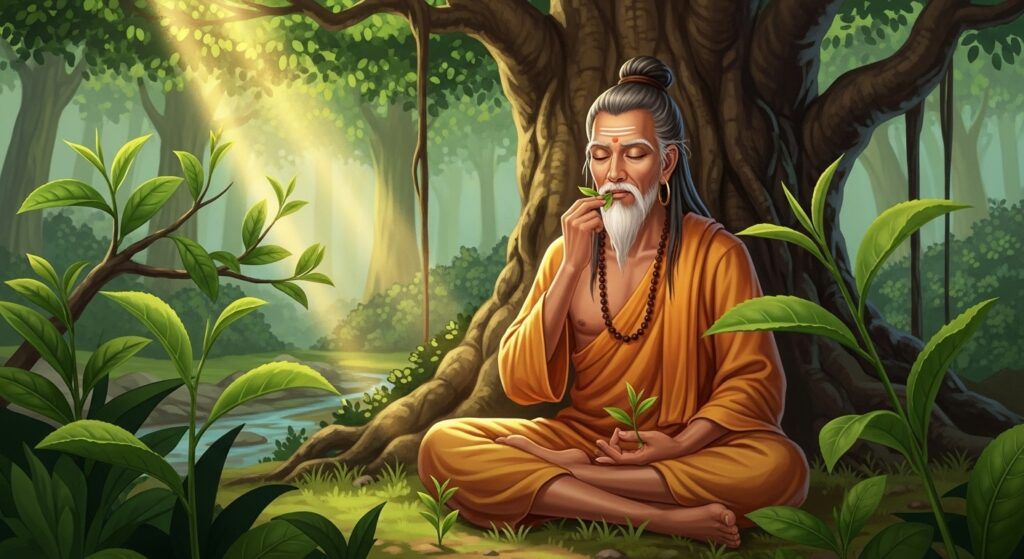Tea, one of the most popular beverages in the world, has a rich and fascinating history. While modern cultivation and trade practices are well-documented, India boasts a legendary origin story that blends mythology, spirituality, and nature. Many people often wonder, what is the Indian legend regarding the discovery of tea, and how it connects to Indian culture and tradition.
This article explores the legendary narrative, historical perspectives, and cultural significance of tea in India. Understanding this legend not only enhances appreciation for tea but also highlights its deep-rooted place in Indian society.
The Indian Legend Regarding the Discovery of Tea
According to Indian folklore, the discovery of tea is attributed to a divine or accidental revelation. One popular legend states that:
-
A wandering sage, often linked to spiritual seekers, was meditating near a wild tea plant in the northeastern forests of India.
-
The sage accidentally crushed some leaves, releasing an aromatic scent that caught his attention.
-
Curious, he brewed the leaves in hot water, discovering a refreshing and invigorating drink.
-
The beverage was then shared among local villagers and travelers, spreading gradually throughout the region.
This legend emphasizes tea as a gift from nature, discovered through mindfulness, observation, and curiosity. It reflects the Indian worldview, where harmony with nature often leads to innovation and enlightenment.
Alternative Indian Legends
While the above story is the most widely circulated, several variations exist across Indian regions:
-
Divine Inspiration: Some legends suggest that the gods or celestial beings guided sages to the tea plant as a source of health and vitality.
-
Accidental Discovery by Hunters: Local hunters in the Assam or Darjeeling regions allegedly boiled leaves by accident while preparing food, leading to the creation of tea.
-
Healing Powers: Folk tales often describe tea as a remedy for fatigue, digestive issues, or spiritual fatigue, emphasizing its medicinal and restorative qualities.
Each legend, while differing in details, underscores the intrinsic link between tea and Indian spirituality, wellness, and daily life.
Tea in Ancient India
Historically, India has a long-standing relationship with plants and herbal infusions. Even before the widespread popularity of Camellia sinensis (the tea plant), Indians were familiar with herbal beverages:
-
Infusions of ginger, tulsi (holy basil), and mint were consumed for their medicinal properties.
-
The integration of wild tea plants into daily life reflected a seamless blend of nature, spirituality, and utility.
-
The northeastern regions of India, particularly Assam, were recognized for their lush forests and indigenous tea plants.
The legend of tea’s discovery complements these practices, portraying tea as both a beverage and a symbol of cultural identity.
The Spread of Tea in India
While the legend centers on a mystical discovery, historical records show that tea cultivation in India became prominent much later:
-
Assam Tea: Indigenous to Assam, this variety was discovered by the British in the early 19th century and later cultivated commercially.
-
Darjeeling Tea: Introduced in the 1840s, this region’s high-altitude tea became renowned for its unique aroma and flavor.
-
Nilgiri Tea: Southern India contributed another distinctive variety, expanding the diversity of Indian tea.
The mythical legend, combined with these historical developments, helped position India as one of the world’s leading tea producers.
Cultural Significance of Tea in India
Tea is more than a beverage in India; it is a social and cultural phenomenon:
-
Hospitality: Offering tea is a traditional gesture of welcome in Indian homes and gatherings.
-
Street Culture: Chai stalls (“tapris”) are integral to everyday life, fostering community interaction.
-
Spiritual Practices: Tea is sometimes consumed during meditation or as part of Ayurvedic wellness routines.
-
Festivals and Ceremonies: Tea features in numerous social rituals, enhancing its symbolic value.
The legend of tea’s discovery reinforces these cultural practices, framing tea as a sacred and revitalizing drink.
Health Benefits Associated With Tea
The Indian legend also emphasizes tea’s restorative properties. Modern science confirms several health benefits:
-
Antioxidants: Tea contains catechins and polyphenols that protect cells.
-
Mental Alertness: Caffeine in tea enhances focus and concentration.
-
Digestive Aid: Certain teas improve digestion and metabolism.
-
Stress Relief: Herbal and traditional teas can reduce stress and promote relaxation.
The legend’s emphasis on vitality and rejuvenation aligns with these contemporary understandings, highlighting why tea became an essential part of Indian daily life.
Tea in Indian Literature and Folklore
Indian literature, folklore, and oral traditions reference tea and similar infusions, often portraying it as:
-
A divine or magical gift from nature
-
A source of physical and spiritual nourishment
-
A companion for sages, poets, and travelers on long journeys
These narratives underscore the reverence with which tea was regarded, even before it became a commercial commodity.
How the Legend Influences Modern Tea Culture
The legendary discovery of tea in India continues to shape perceptions and practices today:
-
Premium Branding: Indian teas, especially Assam and Darjeeling, are marketed with stories emphasizing tradition and mystical origins.
-
Tourism: Tea gardens and plantations incorporate the legend into visitor experiences.
-
Culinary Arts: Tea-based beverages, desserts, and recipes celebrate the historic and mythical significance of tea.
-
Wellness Trends: Ayurvedic and herbal teas reference the ancient connection between nature, spirituality, and health.
The legend enriches the narrative of tea, adding depth to its commercial and cultural value.
Looking Ahead: The Future of Indian Tea and Its Legends
As India continues to be a major player in the global tea market, the legend of its discovery remains relevant:
-
Cultural Preservation: Efforts to maintain the folklore in educational and tourism sectors.
-
Sustainable Farming: Connecting traditional practices with environmentally friendly cultivation.
-
Innovation: New blends and wellness teas inspired by historic and legendary narratives.
-
Global Appreciation: Sharing the story of tea’s legendary origins fosters cultural exchange and respect.
The fusion of legend, history, and modern practices ensures that Indian tea retains its mystical and cultural significance.
Conclusion
The story of what is the Indian legend regarding the discovery of tea blends myth, nature, and culture into a narrative that has endured for centuries. From wandering sages to accidental discoveries, these legends highlight tea as a sacred and revitalizing beverage.
Beyond folklore, India’s historical cultivation, regional varieties, and cultural practices underscore tea’s integral role in daily life. Whether enjoyed in a street-side chai stall, a serene tea garden, or a ceremonial setting, tea continues to connect people, culture, and history.
Looking ahead, the legend not only enhances the appreciation of tea but also inspires sustainable practices, culinary creativity, and global cultural exchange. Understanding this legend allows us to savor every cup of tea not just as a drink but as a story steeped in Indian heritage.







